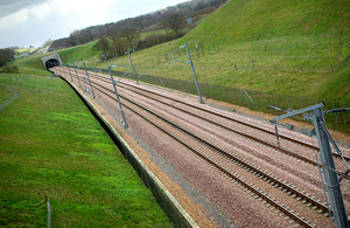The Oakervee review, written some time at the end of last year and published last month, recommended continuing with the full HS2 rail network, a recommendation that the Government was happy to support.

Constructing HS2 track and tunnels will be carbon-intensive
As ministers had selected Doug Oakervee to carry out the review, neither outcome was at all surprising.
Among the points listed in the review report as implicitly leading to Mr Oakervee’s overall conclusion was a finding that: ‘HS2 could help deliver the government’s commitment to bring all greenhouse gas emissions to net zero by 2050.’
Analysis of the detail of this report not only shows that this finding represents a sleight of hand by Mr Oakervee but illustrates the weakness of a net zero target.
The following excerpt from the document highlights the problem: ‘In the short to medium term, the construction of HS2 is forecast to add to carbon emissions. The most recent estimates from HS2 Ltd on emissions from construction of the full HS2 network are at between 8m and 14m tonnes of CO2e (carbon dioxide equivalent) over the construction period, around 0.1% of current UK emissions on an annual basis.’
Obviously, the question that the document then addresses is whether the carbon savings from less carbon-intensive travel will be worth the emissions from construction. In short, it is unclear that they will.
The report notes that HS2 may encourage people to travel by rail instead of car but that 'the relative carbon benefits of rail compared with car travel will diminish as cars electrify'.
Overall, it finds that ‘the operational footprint of the full HS2 network is estimated by HS2 Ltd at saving circa 11-12m tonnes of CO2e over the first 60 years of operation’.
On the basis that the 11 million tonnes figure is smack in the middle of the 8-14 million range for construction emissions, the report notes that ‘it is not clear whether overall HS2 is positive or negative for greenhouse gas emissions.
‘Based on the current assessment, if the low end construction emissions are achieved, HS2 will reduce carbon emissions by 3-4m tonnes of CO2e; at the high end, the project will contribute 1-3m tonnes of CO2e over the assessment period of construction and 60 years of operation.’
It is also worth noting, following the government's recent announcement on increasing the ethanol content of petrol, that E10 has the potential to cut CO2 from transport by 750,000 tonnes per year. This is annually saving around a quarter of the entire CO2 savings of HS2 over 60 years under the most optimistic estimates.
Bear in mind that the full network is now not likely to be complete until 2040, which means that the assessment period over which the project could, on balance, be carbon neutral is the end of the century, half a century on from 2050.
The point about carbon dioxide emissions is that their impact is cumulative. It’s no good frontloading your emissions and then saying in 2050 that a new rail link is cutting current carbon emissions when the greenhouse gases emitted during its construction are still in the atmosphere.
This brings us back to the question of whether HS2 will really contribute to achieving net zero in 2050, which depends on how the calculation is made, which itself is very unclear.
The Office for National Statistics points out that one method is to calculate the UK’s carbon footprint, which estimates UK greenhouse gas emissions based on the consumption of all goods and services by households within the UK and includes ‘estimates of emissions associated with each stage of the supply chain for those goods and services, irrelevant of whether or not their production process occurs within the UK’.
Whether this carbon footprint method will be used to calculate whether the UK has achieved net zero, and whether it would require a proportion of the construction of the carbon cost of a transport service to be counted against the operation of that service, is, dare I say, up in the air.
Register now for full access
Register just once to get unrestricted, real-time coverage of the issues and challenges facing UK transport and highways engineers.
Full website content includes the latest news, exclusive commentary from leading industry figures and detailed topical analysis of the highways, transportation, environment and place-shaping sectors.
Use the link below to register your details for full, free access.
Already a registered? Login